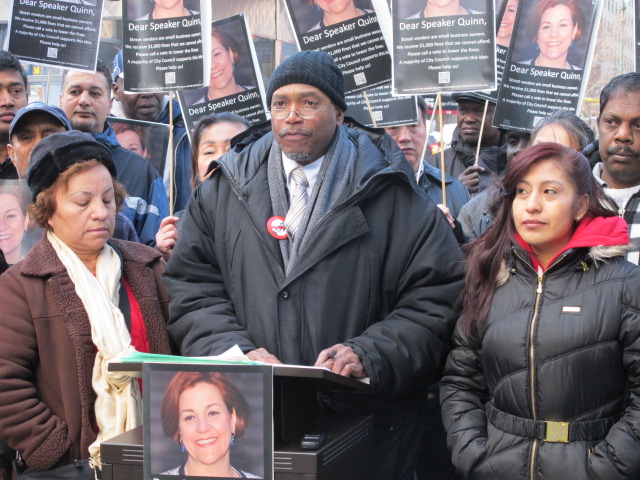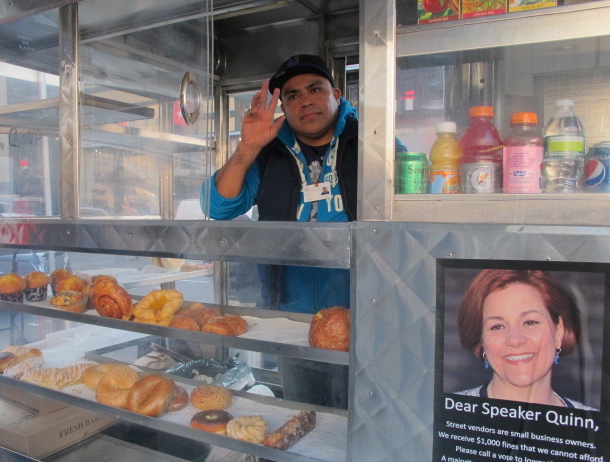Submitted for class on Dec. 15, 2012

Hakim Abdurraheem, a board member of the Street Vendor Project, speaks alongside vendors and fellow board members Maria Leone, left, and Guadelupe Galicia, right, at a rally near the corner of 8th Avenue and 32nd Street on Thursday, Dec. 13. (Philippe Theise)
Over 30 street vendors rallied on Thursday, Dec. 13 at the corner of 8th Avenue and 32nd Street to urge City Council Speaker Christine Quinn to help pass legislation that would reduce fines for violations of city code.
“We are all small businesspeople,” said Hakim Abdurraheem, a board member of the Street Vendor Project, which organized the rally. “We cannot afford these fines and stay in business.”
The fines Abdurraheem referred to can reach $1,000. But Job Sarabia, a vendor who sold pastries, bagels, and coffee out of a silver cart just behind the rally, said that a city inspector charged him $1,200 earlier this year for displaying an expired license, even though the vendor had a new, valid license that he immediately produced when presented with the ticket.
Sarabia also said that he recently received a $300 fine for having a quarter-gallon of milk over 41 degrees, despite intending to pour out the liquid and close for the day.
The vendor said that he usually makes $300 a week after expenses, and $400 or $500 when business is good.
“We’re making a living, we’re not getting rich,” he said.
Board member Maria Leone, who sells scarves and hats in Soho, said that she can’t afford the fines, and later said that tourists who used to accept her $10 and $5 prices now try to bargain her down.
“It’s too high. The economy is worse. We just work for tickets now!” she said.
Sarabia, Leone, and their fellow vendors want Quinn to allow a vote on Intro 434, a bill that would reduce the highest fine to $250, and Intro 435, which would insure that fines increase only if vendors repeatedly break the same provision, rule, or regulation. City Council Member Stephen Levin introduced the bills in 2010.
According to her office, the speaker is “reviewing the legislation.”
Daniel Biederman, a consultant and the co-founder and president of the 34th Street Partnership, a Business Improvement District, called the food carts that dot the area around Madison Square Garden and Penn Station “a disgrace,” with “horrendous-looking neon signs” and generators that emit fumes.
He also objected to the placement and size of the carts, claiming that pedestrians walk in the street at rush hour for the lack of sidewalk space.
“We spent 50 million in capital improvements,” Biederman said. “[The carts] ruin everything we’ve accomplished.”
Biederman also said that the vendors themselves “are not unreasonable people,” and that he would not oppose the presence of fewer, smaller carts with “aesthetic standards.”
He said that the Street Vendor Project mischaracterizes its members as “the little guy.”
“These are not small businesses, these are big businesses,” Biederman said. “They’re not the owners, almost all these carts are run by entrepreneurs.”
But according to Sean Basinski, a former vendor who directs the Project, the issue is not who owns the carts, but who pays the fines.
“We would not be worrying about these issues if there was some big company paying these fines,” Basinski said.

Street vendor Job Sarabia waves to a departing customer from his cart near the corner of 32nd Street and 8th Avenue on Thursday, Dec. 13. Sarabia, who earns between $300 and $500 per week, said that city fines are disproportionate to vender income. (Philippe Theise)
Sarabia, who has been vending for about 10 years, said he always has to pay when he gets a ticket.
“I get the ticket. [I] pay. That’s the way it works.”
Biederman, who said that vendors have approached him after civic meetings to express favor for improved health standards for carts, criticized the complexity of current vendor regulations.
“Even a PhD couldn’t understand them,” he said.
In the months ahead, the Street Vendor Project aims to place 5,000 stickers featuring a smiling Quinn and an outline of its position on carts around the city, with an eye toward next year’s mayoral election.
“[Quinn is] running for mayor now, she needs to listen to the people,” Basinski said.